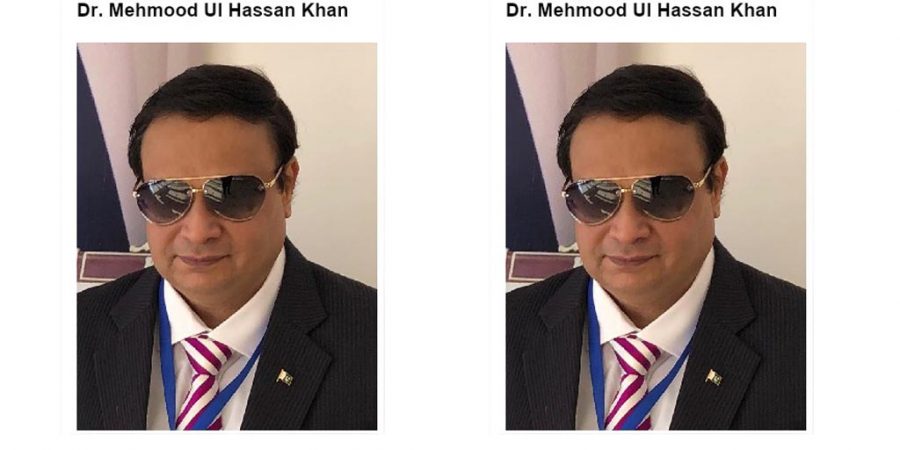Parts of a Circle: History of the Karabakh Conflict

Dr Mehmood Ul Hassan Khan
Fascist Armenia has been trying to mislead the international community about its past which is full of ethnic cleansing, genocide and state sponsored terrorism against innocent and civilized Azerbaijanis by distorting the hard facts through different means. The release of Parts of a Circle: History of the Karabakh Conflict is another systematic attempt to disseminate its falsified interpretation of history, causes of Nagorno-Karabakh massacre, national identity, socio-political and cultural affiliation with the native land.
Conciliation Resources released a 76-minute documentary “Parts of a Circle: History of the Karabakh Conflict that tries to address the Armenia-Azerbaijan conflict 26 years after the ceasefire.
Being prominent regional expert of Azerbaijan & CIS I totally reject one-sided Armenia version of the film which tries to manipulate its script and pollutes the minds and souls of general masses. It has numerous serious inaccuracies and omissions.
Human psychology is a complex phenomenon whereas criminals tend to make castles of their purity, decency, civility, and humanity through fabricated stories, false fictions, unreal folks, poisonous deeds and last but not least, venomous traits and new film “Parts of a Circle: History of the Karabakh Conflict” is another attempt to deceive the regional audience and international community about the real cause of its illegal occupation on the 20 percent territories of Azerbaijan by using brutal power.
In other words, this film is an international project of Armenia so-called justification of the unfolded stories of callousness, unkindness and prosecution towards Azerbaijanis. This film is pathbreaking collaboration between Armenian and Azerbaijani filmmakers made with the support of Conciliation Resources, a London-based NGO, showing each side’s perspective on some of the conflict’s most controversial and painful events. It features interviews with the people who were there both in leading political roles and as ordinary citizens as well as previously unseen archive footage.
Production of the film started in 2011. It consists of three parts which tell the story of the conflict outbreak in the late 1980s, the war, and the negotiation process. The published film is a shorter, summarized version of the three parts and lasts a little over an hour.
The trilogy was finalized in early 2016. However, it was further delayed due to outbreak of war between Azerbaijan and Armenia in April. After the April War, a final decision was made to disseminate the documentary carefully and gradually. In recent years a number of screenings of the documentary for invited audiences were held in Stepanakert, Yerevan and Baku.
Despite, opinions about various events are expressed by ex-President of Azerbaijan Ayaz Mutalibov, ex-President of Armenia Levon Ter-Petrosyan, and ex-President of the NKR Arkadi Ghukasyan. However, it has flaws and is badly lacking realism and sobriety. Presentation of conflict is not balanced and badly lacking hard facts and bitter realities about human survival and inordinate slavery perpetuate by Armenian against real owners of the land, Azerbaijanis.
Narration of the causes of conflict is not neutral either. It postulates Armenia’s propaganda mission wherein Armenia dramatized as victim not vicious villain, supporter of ethnic unity not scoundrel and proponent of progression/prosperity not partner of evil propositions which depicts height of virtual misappropriation of history full of horrendous crimes committed by Armenia, the ultimate aggressor and enemy of helpless humanity.
Unfortunately, the film deliberately negates the existence of notorious nationalist and expansionist greater Armenia project which was one of the most important elements of the conflict. Moreover, legal aspects of the looming conflict is consciously ignored, otherwise, it can completely dismantle fortress of falsified attributes of Armenia.
Being prominent regional expert of Azerbaijan & CIS I evaluate that some parts of the documentary facts are absolutely indistinct or could not illustrate the objective history of the conflict. Even basic principles of international law mainly, respect for sovereignty, territorial integrity of states, use of peaceful means for conflict resolution, importance of diplomacy, dialogue and development are intentionally overshadowed through self-delusion of Armenians.
Balancing act/approach and equilibrium of point of view as claim by filmmakers are factually incorrect and needs rectification. From the ancient court of Romans to modern day presidency of the US, grief, sorrow, pain, injustice, holocaust, aggression, butchery and genocide cannot be equated with gratification, supremacy, pleasure, just-fullness, hope, association, brotherhood and generosity.
It is the basic essence of even modern human civilization that aggressors and invaders must be distinguished from victims but said film intentionally tries to establish so called balancing approach and functional correlations between the Armenians and Azerbaijanis, simply a height of intellectual dishonesty and distortion of bitter realities.
Armenia has been aggressor and badly indulged in series of ethnic cleanings against innocent Azerbaijanis during 1905- 1918 and illegally occupied territories of Azerbaijan. There is a justification of every wrongdoing as upheld by a German jurist in famous Hollywood movie “Judgment at Nuremberg” is a self-defeating approach because distressing and contemptible past of anybody does not pardon him/her from ultimate wordily accountability and punishment from the law of nature.
International law is a complex and complicated discipline which pursues in accordance with the existing universal legal principles and norms where decisions/judgments are made on witnesses, solid documentary proofs and examination of bilateral or trilateral treaties to resolve any conflict and fabricated and distorted of history achieve nothing but more isolation, condemnation and marginalization.
Filmmakers seem to be biased and prejudiced in their approaches towards the exploration of very conflict Nagorno-Karabakh. They intentionally try to form equilibrium between the conflicting parties through the help of virtual reality inject the invader’s narrative into the movie in order to justify the separation of Nagorno-Karabakh region from Azerbaijan and the occupation of the surrounding districts. Moreover, root cause of the separation of Nagorno-Karabakh i.e. nationalist idea of Great Armenia which was one the main reasons of this unforgettable human tragedy, completely ignored in the said film. Being prominent regional expert of Azerbaijan & CIS I, fear that tall claims of filmmakers about relevancy of this film towards conflict resolution will be dashed into the ground because it lacks perfection, preciseness, and true presentation. Incorporation of some cadres on Khojaly massacre and Azerbaijani IDPs reconfirm my stance against so called balanced approach of the filmmakers.
In the documentary filmmakers tried to establish economic disparity, social discrimination and political oppression against Armenia were the driving force to wage war against real son of the land i.e. Azerbaijanis. It is not based on any official statistics thus slanted towards Armenia. Furthermore, most of the important historical events relating to Armenian nationalists are covered-up with causal narration of events/interviews.
The plight and pain of the thousands of displaced Azerbaijan were resembled with “dead man walking” but it was just purposefully omitted. Even sad incident of black January tragedy and brutal massacre of helpless Azerbaijanis was misreported in the film thus filmmakers showed their disrespect to departed souls of hundreds of ordinary people/Azerbaijanis fighting for freedom, national dignity and pride who fought bravely against military aggression of Soviet troops and ultimately liberated Baku and rest of the country.
Producers of the film did not show uncivilized activities of the aggressors in other districts outside of the Nagorno-Karabakh region i.e. Lachin, Gubatly, Zengilan, Jabrayil, Fuzuli and Aghdam. People were slaughtered like animals. People were slain like poor sheep. Blood was everywhere and enemies of humanity, civility and even nature were free to complete their bloodbaths against docile Azerbaijanis.
The film also casually surpassed the importance of the UN Security Council resolutions 822, 853, 874, 884 as projected if all of them were the same and adopted on the same date. Moreover, producers tried to form the strategic justification of occupation of Azerbaijan territories from Armenian perspective, as if the occupation of Azerbaijani territories should be treated as a normal state of things.
The filmmakers tried to sabotage incident of Khojaly by interviewing Vitaly Balasanyan who was one of the main perpetrators for the mass murder of Azerbaijan civilians. It is like giving knife to monkey for persuasion of so called justice. It seems that producers do not have any knowledge about history which is full of self-confessions of Armenians terrorists, separatists, smugglers and paddlers like Serj Sarkisian, Markar Melkonian and Monte Melkonian who deliberately assaulted on the civilian population belonging to Azerbaijanis. Ironically, no interview was conducted with the survivors of Khojaly genocide.
The producers also did not include Azerbaijanis from different parts of Nagorno-Karabakh, Shusha, Khankendi, Khodjavend, Aghdere and etc. The film also did not invite the official representatives of Azerbaijani community of Nagorno-Karabakh region, those once who lived with Armenians together and those who are supposed to determine the common future of the region with their Armenian cohabitants.
The film is totally silent about the series of terrorist attacks against civilians in different parts of Azerbaijan in the very early 1990s. It thoroughly discusses the “Operation Ring” by the Soviet law-enforcement agencies in the Nagorno-Karabakh region during 1991. It badly fails to discuss the process of arming of the Armenian militias in the region and their terror against the Azerbaijani population.
The film “Parts of a Circle: History of the Karabakh Conflict” has missed another golden opportunity to portray true facts of the history of Nagorno-Karabakh conflict. Most important causes mainly, Armenian historical fascistic attitude, hegemonic inspirations, conspiratorial engagements and complexity pertaining to international law are badly missing or otherwise underreported in the film. Paradoxically, producers tried to equate villain with valiant and aggressors with victims and illegal occupation was justified too.
Being prominent regional expert of Azerbaijan & CIS, I term the film “Parts of a Circle: History of the Karabakh Conflict as biased and prejudiced. I request to producers of this movie to please rise above their self-fabricated notions of neutrality, equality, balancing approach because history is not a “comedy of errors” but full of bloods, sacrifices, martyrdoms, collateral damages and spirits of bravery, chivalry and unfolded stories of true patriotism, nationalism and of course heroism. Azerbaijan stands for peace whereas; Armenia has already been stigmatized as dragons. Azerbaijan speaks about humanity and harmony whereas Armenia
Related News

Shehbaz, Qatar Amir Pledge to Strengthen Fraternal Relations
LONDON, FEB 17: Prime Minister Muhammad Shehbaz Sharif held a telephone conversation with His HighnessRead More

Experts call for ‘One-Stop’ crisis centers to combat VAW as cybercrime surges
ISLAMABAD, Feb 17: Experts and digital rights advocates have stressed the need for an urgentRead More


Comments are Closed